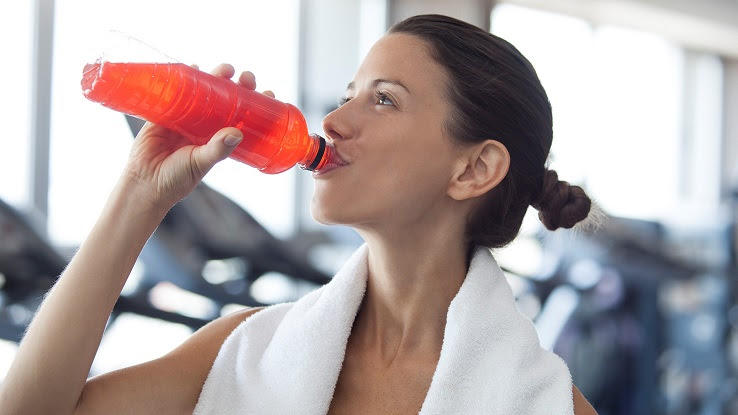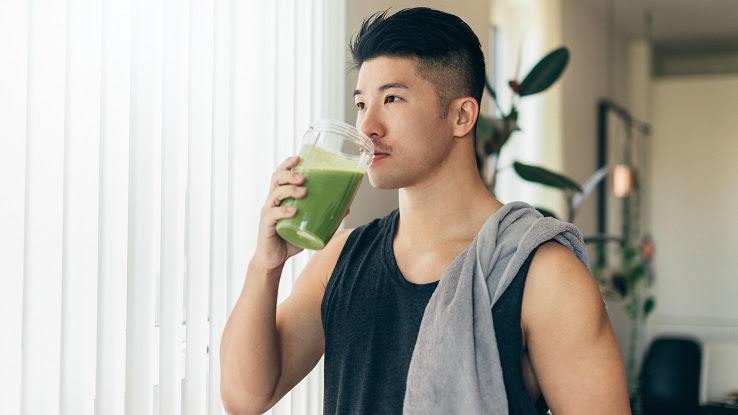
Following an intense exercise session, many people reach for sports drinks, like Gatorade or Powerade. But are sports beverages really the best hydration drinks when it comes to your post-workout recovery? While sports drinks have some benefits, there are an array of choices that may prove healthier when it comes to restoring your electrolytes.
In addition to exploring why it’s important to stay hydrated and the risks associated with dehydration, we’re delving into some of the top rehydrating drinks that you should consume post-workout. Here’s everything you need to know.
Why Should You Stay Hydrated?
Although it may seem obvious, hydration is crucial to maintaining you physical and mental wellbeing. Adult humans are made up of approximately 60% water — and that includes all the water in your organs, muscles, and skin. Following that logic, dehydration can impact your body’s essential functions. According to Harvard’s School of Public Health, you must stay hydrated “to regulate body temperature, keep joints lubricated, prevent infections, deliver nutrients to cells, and keep organs functioning properly.” Hydration also promotes positive eye and skin health as well as a stable digestive cycle.

When it comes to mental health, proper hydration helps you maintain a more positive rest cycle and greater clarity of thought. It also helps regulate your moods; while hydration promotes a stable, positive mood, dehydration can lead to irritability, emotional instability, and mood swings. Your cognitive ability, sensory processing, and focus increase when you are well-hydrated. On the flip side, dehydration will leave you feeling unenergized and unfocused.
What Exactly Is Dehydration?
When you do not consume the amount of fluids you need to meet your body’s needs, you are considered dehydrated. Often, you can become dehydrated when exercising, but the condition can also occur in more extreme ways if you are battling illness or experiencing intense exposure to sunlight.

While most people understand that being dehydrated isn’t good, you may not realize just how many mild to moderate symptoms it can cause, including fatigue or light-headedness, headaches, a lack of urination, rapid heartbeat, and low energy. More significant cases of dehydration can even lead to severe confusion, delirium, and fainting. That said, it’s important to stay hydrated, especially if you’re under the weather, enjoying the sun, or working out.
What Do You Need to Replace After Exercise?
When you sweat during a workout, you lose electrolytes — essential minerals such as potassium and sodium. Healthy electrolyte levels contribute to your organs functioning successfully, from your brain to your heart, lungs and kidneys.

If you lose electrolytes during exercise and don’t replace them, you’ll likely feel unenergized, weak, and faint. Your body and brain require a healthy amount of electrolytes to keep you conscious and active. Due to how many electrolytes you lose in the process of exercising, it’s essential to restore them through electrolyte-rich drinks, which also combat dehydration.
Best Liquids for Post-Workout Hydration
Chocolate Milk
Oddly enough, chocolate milk is at the top of the list of post-workout recovery drinks. Chocolate milk has a high water content, so that’s some points in the hydration category. Additionally, it contains calcium, magnesium, and potassium, which are all electrolytes that need post-workout replenishing. The large protein and carb content of chocolate milk also has a positive effect on muscular recovery. Chocolate milk contributes glycogen — a glucose offshoot that’s diminished when you exercise — to the body, helping you quickly restore your energy. All in all, chocolate milk is a well-rounded solution to fend off dehydration after exercising.
Coconut Water
Coconut water is full of restorative levels of electrolytes, including calcium, sodium, potassium, magnesium, phosphorus, and selenium. It’s also super versatile as an ingredient, so whether you want to drink it by itself, mix it into a smoothie bowl, or add it into a post-workout protein shake, you can reap coconut water’s benefits in numerous ways.

Fruit Juice
The high electrolyte and water content of 100% fruit juice is what makes it so ideal as a post-workout drink. Fruit juices, such as cherry juice, apple juice, and orange juice, all boast additional health benefits. Not only can they help you meet your daily fruit intake, but they also provide tons of vitamins and minerals. Typically, fruit juice contains antioxidants, which fight inflammation and allow your muscles to recover more quickly. However, be mindful of how much fruit juice you drink; most are high in sugars.
Smoothies
This doesn’t include every kind of smoothie, but real-fruit smoothies and Greek yogurt-based smoothies both have plenty of health benefits. In addition to aiding in rehydration, these smoothies can boast a mix of protein, vitamins, and antioxidants that are ideal for replacing lost electrolytes, staving off muscle weakness and promoting a speedier recovery. While the simple sugars in fruit smoothies are excellent for restoring your glucose stores, it’s important to drink these in moderation to ensure you’re not over-consuming sugars.
Protein Shakes
While many store-bought protein shakes include unhealthy add-ins, homemade protein shakes can help you meet your nutritional and hydration needs with ease. A healthy protein shake should feature a good balance of protein, carbs, and healthy fats. You can prepare your own protein shakes using a store-bought protein powder and other natural ingredients, such as fruit, milk, and nut butter.
Pros and Cons Associated with Sports Beverages
Sports beverages are convenient. Products like Gatorade and Powerade come in easy-to-carry bottles, making them easy to toss into your workout bag if you’re rushing out the door. Unlike chocolate milk, sports drinks can withstand hot and cold temperatures, making them great if you’re working out for a long period of time. Not to mention, they’re cheaper than coconut water — or all those ingredients you’ll need for at-home protein shakes.

Still, sports drinks aren’t the first thing experts recommend when it comes to rehydration. Although they can replenish electrolytes, a lot of sports drinks are also extremely high in sugars. Some even contain high-fructose corn syrup. That said, drinking too many sugary sports drinks can have an adverse effect on your rehydration process and lead you to surpass what’s deemed a “healthy” amount of daily sugar, which, in the long run, can lead to weight gain, a drop in your mood, fatigue and more. Finally, sports drinks contain acids that contribute to tooth decay over time.
So, while you may enjoy a sports beverage post-workout from time to time, it’s important to seek out alternatives and find a healthy balance.
Resource Links:
- “The importance of hydration,” Harvard T.H. Chan School of Public Health | Harvard University
- “Mayo Clinic Minute: What should be in your sports drink?” Mayo Clinic
- “Mayo Clinic Q and A: What to drink to stay hydrated,” Mayo Clinic
- “Coconut Water,” U.S. Department of Agriculture (USDA)
- “Should You Drink Chocolate Milk After a Workout?” Cleveland Clinic





